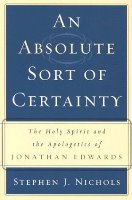Jonathan Edwards (1703-1758) continues to speak and hold our interest. He was perhaps America’s greatest theologian, one of those rare figures whose thinking and passion ran deeper than most any other.
In his An Absolute Sort of Certainty: The Holy Spirit and the Apologetics of Jonathan Edwards, the well-known Christian historian Stephen J. Nichols seeks to display the “center” of Edward’s thinking and ministry – a rich resource for for students of Edwards, for apologists, and for pastors who seek to preach persuasively to our own generation.
Endorsements:
Here are two endorsements for Nichols’ book:
C. Samuel Storms:
I’ve long waited for a clear and competent study of Edwards on apologetics and the role of the Holy Spirit. Now it is here. No student of Edwards can afford to overlook Nichols’s superb contribution.
William Edgar:
Nichols has done us the great service of understanding Edwards, first, from his own writings, and second, as an heir to Calvin. He shows us the true face of Edwards, whose greatest concern was for God’s glory, even in the right use of reason and confidence in revelation.
Introducing …
The following is excerpted from Nichols’ Introduction to his work.
Introduction
Recently, interpreters of Jonathan Edwards have turned to apologetics in the hope of finding the center of Edwards’s thought and the interpretive key to understanding this formidable Colonial figure. …
This approach to Edwards as an apologist may seem somewhat out of place. He never wrote an apologetics text per se. He is a theologian to some, a philosopher to others, and a pastor to still others, but rarely is he anyone’s apologist. Yet approaching Edwards as an apologist has much to commend it, and may be more useful than other interpretive grids. Apologetics finds itself in the dialectic between theology and philosophy. Consequently, it makes sense of the disparate or, according to some, competing sides of Edwards. Apologetics relieves the tension between Edwards as a churchman and Edwards as a philosopher. In short, apologetics not only accounts for the different aspects of Edwards’s writings, but brings them together into a cohesive whole.
If Edwards may be understood through the paradigm of apologetics, then the task remains to determine the nature of his apologetics. This work intends to reveal the contours of his apologetics by focusing on his treatment of particular doctrines pertaining to the Holy Spirit, such as inspiration, regeneration, illumination, and especially assurance. Edwards places each of these doctrines in the context of the philosophical debates of his day. The Enlightenment’s preoccupation with the problem of knowledge interested Edwards from the time he first read John Locke as a student at Yale until he made the final entries in his notebooks shortly before his untimely death. He wrestled with epistemology as he worked out his theology of the Holy Spirit; he developed his theology, as it were, in full view of philosophy and vice versa.
Edwards’s doctrines of inspiration, regeneration, illumination, and assurance show that he anchors his apologetic theocentrically, or perhaps pneumatocentrically, as these various aspects of the work of the Holy Spirit combine to produce an “absolute sort of certainty.” These words come from his notebook “The Mind,” and pertain to the Spirit’s work of inspiration. The best evidence of inspiration, Edwards argues, is the sense of absolute certainty that attaches to Scripture. This sense of certainty is produced by the Holy Spirit and reflects Scripture’s divine beauty and excellence.
Buy the books

An Absolute Sort Of Certainty: The Holy Spirit And The Apologetics Of Jonathan Edwards